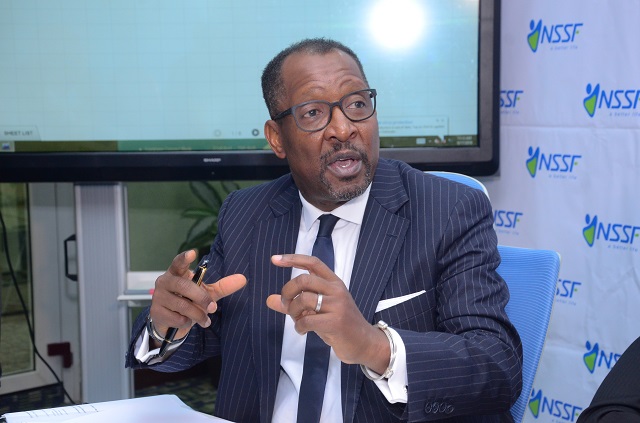
Kampala, Uganda | THE INDEPENDENT | Officials in the pension sector are debating the idea to change the name of National Social Security Fund (NSSF) because ‘the way it is now’ doesn’t speak to what the fund is.
Martin Nsubuga, the executive director of the Uganda Retirement Benefits Regulatory Authority (URBRA), the sector regulator, says it’s time to reconsider the name to remove the phrasing social security.
Nsubuga says the current name is confusing the public to think NSSF must provide benefits beyond retirement. He said in a virtual meeting via Zoom on Monday evening that the fund should be given a name that reflects what it is. This position attracted a nod from NSSF managing director Richard Byarugaba who said the fund “was provident fund and not a social security fund.”
Byarugaba said there is a huge misconception on the difference between NSSF and social security. He said social security benefits like medical, housing, unemployment and education are a role of the state and it should do that.
Provident fund, which NSSF should be, is expected to receive contributions, invest them and pay out when the saver is going into retirement.
The coronavirus crisis – which has seen companies shut, jobs lost and salaries – ignited demand that savers in crisis should be given a portion (20%) of their money to go through the crisis.
In a letter to the Minister of Finance, Byarugaba argued this would be a bad idea since it would mean selling some of the fund’s assets to raise at least 2.6 trillion Shillings to pay savers.
Byarugaba added that this would raise interest rates in the market as commercial banks would run to buy NSSF assets instead of lending out money to businesses.
In a rebuttal letter, former NSSF deputy managing director Geraldine Ssali argued to the contrary saying the money can be found and that liquidating 20% of assets was a tiny portion of NSSF and that it would have insignificant impact on the interest rates.
Byarugaba has since changed stance saying the fund supports mid-term access and can find the money if the Members of Parliament passed amendments to the NSSF Act to allow for access.
In the latest statement to the members which shows toned down stance to ward off public anger, Byarugaba says he supports members’ needs and midterm access to their money.
Separately, Dr Ezra Suruma, the former finance minister said that drawing money from NSSF at this time is a double-aged sword that needs one to tread carefully. He said his view is that pension funds are not emergency funds.
Some people are still not impressed. Grace Mukwaya, the executive director for Platform for Labour Action, said “as it stands now, NSSF doesn’t seem to know or see the plight of the workers.”
Phiona Mpanga, an advocate and academic at Makerere University said the fund’s legal framework needs to change to reflect the fact that today people change jobs and get out of work more frequently than ever before.
Meanwhile, Nsubuga suggested government can put up something like a bond called COVID-19 Bond which investors can buy and use the money to give to Ugandans who lost jobs or are vulnerable. This would mean government is borrowing.
Whatever happens, a post-COVID-19 will be a moment of reflection for the fund. For many members, it remains an amorphous rich entity but doing little to help its members. Confidence in the fund has taken a serious beating.
President Yoweri Museveni on Monday moved to relax the lockdown guidelines that have been in force since March allowing some sectors of the economy to resume. But with public transport still under restriction for at least two more weeks, the lockdown is still very much in force for the majority of Ugandans.
******
URN
 The Independent Uganda: You get the Truth we Pay the Price
The Independent Uganda: You get the Truth we Pay the Price





